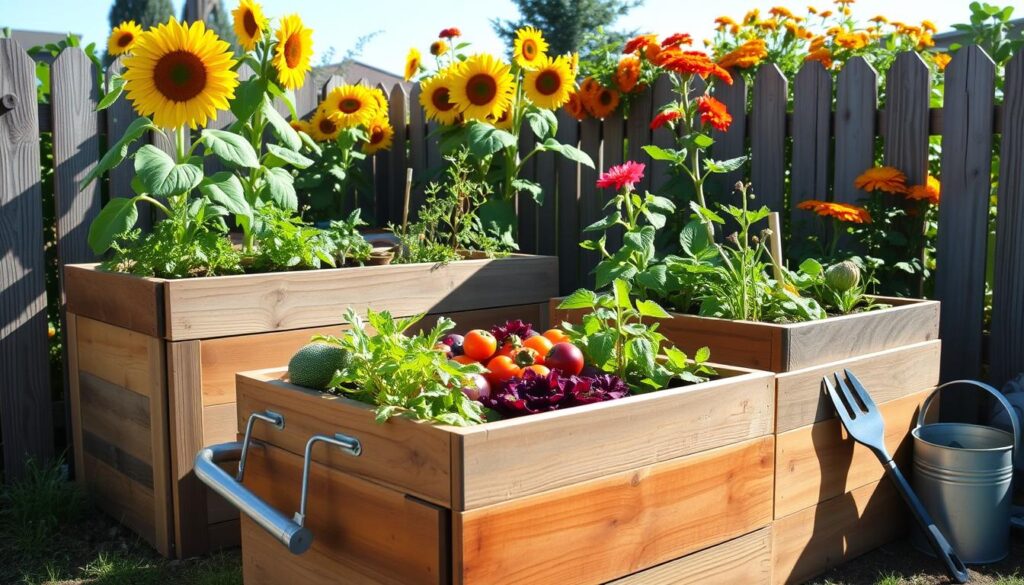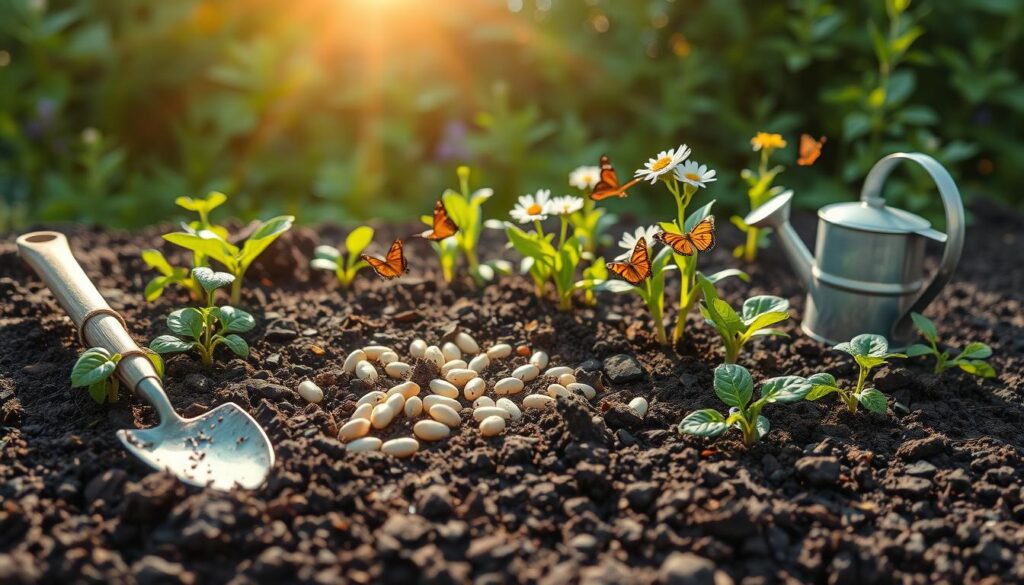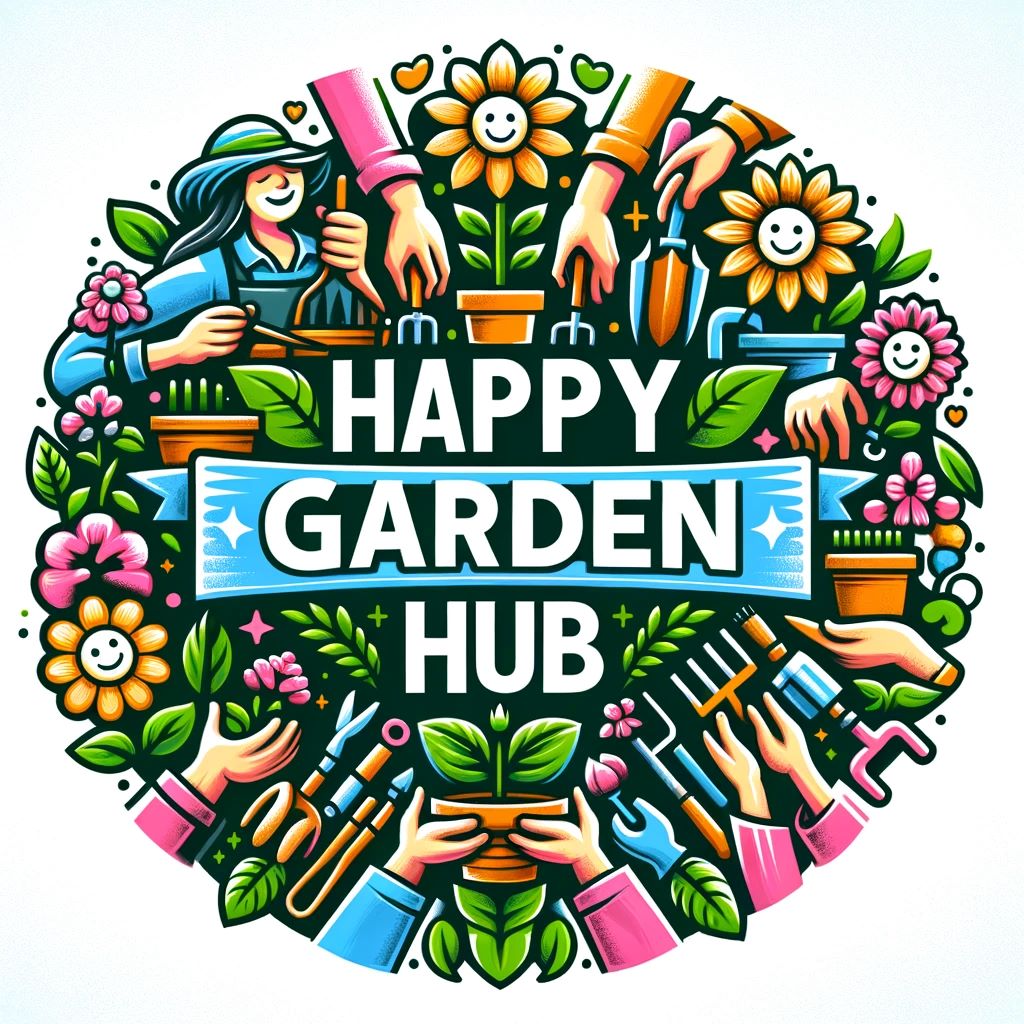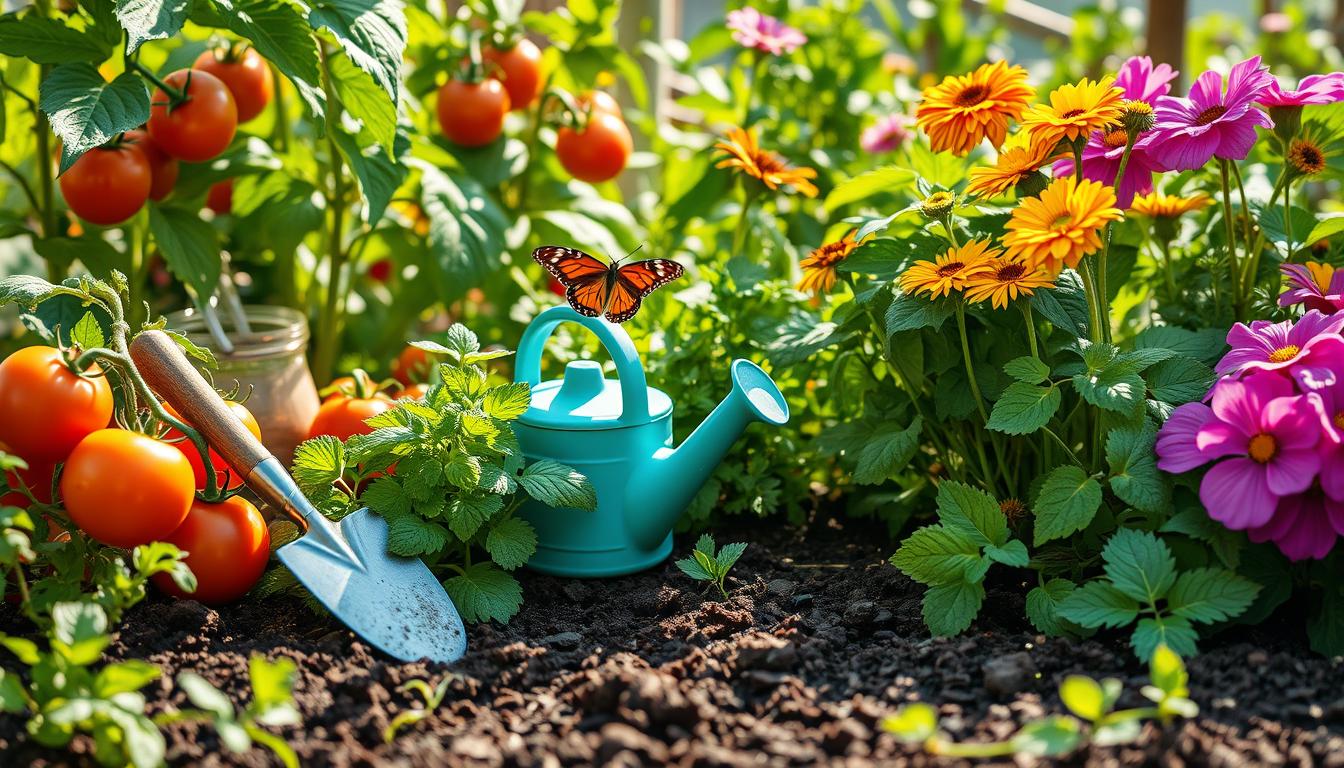This post contains affiliate links.
Watching life bloom under your care is uplifting. Many remember a childhood memory of a grandmother tending to her rose bushes. Or the joy of digging in the earth, fingers stained with soil, heart filled with hope.
Gardening for beginners is more than planting seeds. It’s about nurturing a connection with nature. This connection can soothe and energize. If you’ve hesitated to start, the good news is that gardening is accessible to everyone, no matter your experience.
This article will give you vital beginner gardening tips. These tips will help you avoid common mistakes. They will enable you to step confidently into your gardening journey.
Imagine stepping into your own garden, where every plant shows your dedication. Each blossom is a thrill of achievement. The satisfaction of nurturing your garden is rewarding and can bring peace.
Starting a garden for beginners may seem daunting. But with the right information and a plan, it can become a cherished hobby. It can enrich your life. Join me as we explore the essentials of creating your own lush sanctuary.
Key Takeaways
- Understand your garden’s location to ensure adequate sunlight, essential for most edible plants.
- Starting with quality soil, like sandy loam mixed with organic matter, sets the foundation for a successful garden.
- Container gardening offers a versatile solution for space constraints, making it ideal for urban settings.
- Regular feeding with high-quality plant food is crucial for maintaining healthy plants.
- Consider drip irrigation to keep your garden hydrated during scorching heat waves.
Understanding the Basics of Gardening
Gardening basics are key to a great gardening experience. Knowing how to plan, understand your environment, and the life cycle of plants is crucial. It helps beginners grow successful gardens. Start by learning about your local climate and soil types.
Identify your hardiness zone, which ranges from 1 to 11 in the U.S. and Canada. This helps pick the right plants for your garden.
Knowing how much sun plants need is another important tip. Full sun plants need over six hours of sunlight. Partial sun/shade plants need four to six hours. This knowledge helps choose the best spot for your plants.
Plant types like annuals and perennials require different care. Learning about their growth habits helps plan your garden. It’s also important to know how to deal with pests and diseases.
For a healthy garden, watch the moisture levels. Water only when the soil is dry one knuckle deep. Use nutrient-rich soil and consider container gardening in small spaces.
Regular feeding and mulching help keep weeds away and retain moisture. These practices will make your gardening journey rewarding.
Choosing the Right Location for Your Garden
Finding the perfect spot for your garden is key to your success. A basic rule for beginners is to pick a place with lots of sunlight. Most veggies need at least 6 hours of direct sunlight each day. Even better, aim for 8 hours or more.
Having your garden close to your home is very handy. It makes caring for your plants easy. You can watch them grow and fix any problems quickly.

Checking the soil quality is also crucial. A soil test tells you about the pH level and nutrients your plants need. It’s best to have soil that drains well, ideally in 24 hours. If it takes longer than 8 hours, you might need to improve it or use raised beds.
Make sure your garden is easy to water. Veggies need about 1 inch of water each week. Keep it near a water source, especially when it’s dry. Think about the wind and animal paths to avoid waterlogging and damage.
By thinking about sunlight, soil, and water, you’re ready for a great garden. Plan carefully to avoid problems. For more tips, check out this useful source.
Gardening for Beginners: Key Factors to Consider
Starting a garden is exciting, but it’s important to know a few key things. Sunlight and water are crucial for plants to grow well. The right amount of both can make your garden flourish.
The Importance of Sunlight
Plants love sunlight. Most vegetables need 6 hours of direct sun each day. Pick a spot that gets lots of sun, not shade.
Watch out for trees or buildings that might block sunlight. For beginners, placing plants right for sunlight is key.
Accessibility to Water
Having water nearby is vital for a healthy garden. A close water source makes watering easier. This keeps the soil moist consistently.
A good hose or drip irrigation system can save you effort. Water plants when the soil is dry to a knuckle deep. This keeps them healthy and strong. With these tips, beginners can garden with confidence.
For more tips, check out this resource. It offers essential advice for gardening success.
Starting with Quality Soil
A strong foundation is key for any garden. Quality soil is the backbone of your garden, affecting everything from nutrients to plant health. Learning how to start with quality soil is essential for beginners. It makes gardening easier and more enjoyable.
How to Identify Good Soil
Finding good soil is crucial for a thriving garden. Look for soil that’s rich in organic matter and has a crumbly texture. This means it’s well-aerated and drains well. Here’s how to check soil quality:
- Color: Dark, rich colors mean high organic content.
- Texture: Loamy soil, a mix of sand, silt, and clay, is best for most plants.
- Drainage: Soil should hold moisture but drain excess water to prevent root rot.
- pH Level: Aim for a pH of 6.5, with most veggies doing well between 6.0 and 7.2.
Amending Soil for Better Drainage and Nutrients
Once you know your soil type, you can improve it. Here are ways to enhance soil health:
- Add Compost: A 2-3 inch layer of compost boosts fertility and structure.
- Avoid Fresh Manure: Fresh manure can harm plants. Use composted manure instead.
- Conduct a Soil Test: A soil test shows nutrient levels and needed amendments. Results come in two weeks from your local extension office.

With this knowledge, you’re ready to start gardening. Quality soil ensures healthy plants and a rewarding experience. Understanding soil’s importance is the first step to gardening success.
| Soil Quality Indicators | Ideal Characteristics |
|---|---|
| Color | Dark and rich |
| Texture | Loamy mix (sand, silt, clay) |
| Drainage | Retains moisture, drains excess water |
| pH Level | 6.0 – 7.2 |
Selecting Ideal Plants for Beginners
Choosing the right plants is key when starting to garden. By following some beginner gardening tips, you can have a successful first try. It’s important to pick plants that are easy to grow and fit your local climate.
Top Edible Plants for Beginner Gardeners
Many edible plants are great for new gardeners because they’re tough and don’t need much care. Start with these vegetables:
- Lettuce
- Tomatoes
- Radishes
- Green beans
- Zucchini
- Sweet peppers
- Kale
- Spinach
- Carrots
- Chard
- Beets
- Peas
Most veggies need 6 to 8 hours of sunlight a day and about an inch of water weekly. Plant 3 to 5 of each type to keep harvesting all season. Planting them a few weeks apart also helps keep your produce fresh.
Understanding Your Hardiness Zone
Your hardiness zone is crucial for picking the right plants. It groups areas by climate, helping you choose plants that will do well. Knowing your zone helps you pick the best plants for your area, which is a key tip for beginners. Some good choices include:
- French marigolds, which need little care and help other veggies grow.
- Chives, cold-tolerant and bug-repellent.
- Rudbeckias, zones 3-9, are drought-tolerant and easy to care for.
- Lavender, needing lots of sunlight, can do well even in tough spots.
Adding these plants to your garden makes it look great and gives you tasty food. By knowing about plant selection and hardiness zones, beginners can create gardens that flourish and give lots of rewards.
The Benefits of Using Containers in Gardening
Container gardening is perfect for beginners with little space or resources. It lets you grow many plants, like veggies, herbs, and small fruit trees. Almost any plant that grows well in the ground can also thrive in a pot.
One big plus is managing soil quality is easier. Good potting soil is key for healthy roots. Choose a pot that’s the right size for your plant’s roots; for example, tomatoes need bigger pots.
Container gardening cuts down on weeds, pests, and diseases. This makes gardening easier and less work. You can also move containers to get more sunlight or protect plants from bad weather.
The type of container affects how it holds water. Clay pots are good for air but need more water. Plastic and glazed pots keep moisture steady. Cedar or redwood planters last a long time.
Containers are great for small spaces like balconies and kitchen counters. They’re also good for people with disabilities. Being able to control soil and water makes gardening better for everyone.
| Container Material | Aeration | Water Retention | Durability |
|---|---|---|---|
| Clay | High | Low | Moderate |
| Plastic | Low | High | High |
| Glazed | Medium | High | High |
| Cedar | Medium | Moderate | Very High |
Essential Gardening Tools for Beginners
Starting a garden is exciting. Having the right tools makes it easier and more fun. Knowing what tools you need helps you do your gardening tasks better.
Basic Tools You Need to Get Started
Having the right tools is key for gardening. Here are 12 essential tools for beginners:
- Garden Trowel: Perfect for planting and digging small holes.
- Pruning Shears: Ideal for trimming flowers and branches, ensuring healthy growth.
- Hand Cultivator: Great for loosening soil and removing weeds.
- Watering Can: Useful for targeted watering in specific areas.
- Spade: Best used for digging and edging garden beds.
- Garden Fork: Helps in aerating and turning soil.
- Hose: Essential for watering larger areas; various diameters cater to different needs.
- Leaf Rake: Helps in collecting leaves and organic debris efficiently.
- By-pass Lopper: Useful for cutting thicker branches cleanly.
- Kneeler: Provides comfort while working close to the ground.
- Garden Bag: Perfect for carrying tools and collecting waste while gardening.
- Watering Wand: Offers flexibility for reaching different plants while watering.
Choosing the Right Hand Tools
When picking hand tools, think about comfort and ergonomics. Choose tools with cushioned grips and balanced designs to avoid strain. High-quality materials mean they last longer and work better. Here are some good options:
| Tool | Features | Brand Recommendations |
|---|---|---|
| Garden Trowel | Water-resistant, lightweight | Fiskars, Radius Garden |
| Pruning Shears | Sharp blade, ergonomic handle | Felco, Fiskars |
| Kneeler | Water-resistant, collapsible | GardenHOME, Ohuhu |
| Hose | Diverse diameters, flexible | Flexzilla, Gilmour |
With these simple gardening tips for beginners, you’ll see how important the right tools are. Keep your tools in good shape by storing them dry and organized. Sharpen the blades often for the best results. Start your gardening journey today with confidence!
Avoiding Common Mistakes in Beginner Gardening
Gardening for beginners can be both rewarding and challenging. One common mistake is overestimating the size of a garden. This can lead to too much work and less fun. It’s better to start small and learn as you go.
Another mistake is not understanding frost dates. This can cause plants to be planted too early or too late. It’s also important to make sure each plant gets enough sunlight. Plants that love the sun need at least 6 to 8 hours of sun a day.
Not knowing what each plant needs can cause overcrowding. This happens when plants fight for water and nutrients. It can make plants less healthy and more likely to get sick.
To get better at gardening, follow beginner gardening tips. These tips include observing and learning slowly. Regular care, like weeding and thinning, helps plants stay healthy. Also, taking care of the soil and wildlife can help control pests.
Remember, gardening takes time and practice to get right. Be patient and keep trying, and you’ll see improvement over time.
FAQ
What are some easy gardening tips for beginners?
How can I start a garden with limited space?
What tools do I need as a beginner gardener?
How do I determine if my soil is good for gardening?
What are the best plants for beginner gardeners?
How much sunlight do my plants need?
What common mistakes should I avoid when starting a garden?
How does understanding my hardiness zone help in gardening?
Why is water accessibility important in gardening?
This post contains affiliate links.

